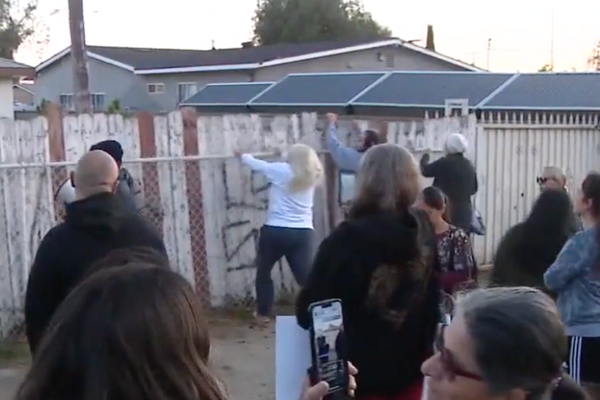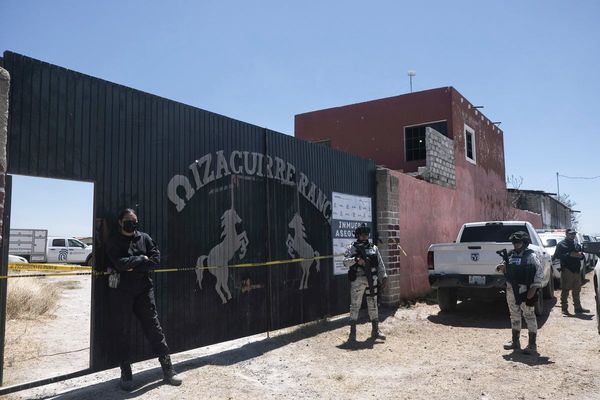
A New South Wales police officer has offered condolences to the grieving family of Gordon Copeland at an inquest into the Gomeroi man’s death.
The NSW coroner is examining the circumstances surrounding the death of Copeland, who died in the Gwydir River in the early hours of 10 July 2021.
On Tuesday, the inquest heard evidence from NSW police officer Crystal Manusu, a senior officer with more than a decade of experience, who was in charge of the Moree police station on the night the young father disappeared.
The senior constable became emotional as she read from a letter to Copeland’s family on Tuesday.
“With the benefit of hindsight if there is anything I could have done differently that would have changed the outcome – I would do it without hesitation,” she told the court on Tuesday.
“I am truly, sincerely sorry for your loss,” Manusu said as she began to cry.
The inquest is examining the events leading up to Copeland’s death, including the decision by police to follow a vehicle he was in, their subsequent search efforts and whether more could have been done to help Copeland after he entered the water.

On Monday, counsel assisting, Peggy Dwyer, told the inquest police officers had begun to follow the black sedan in which Copeland was travelling, over misplaced concerns the vehicle was stolen.
The coroner heard officers found the car bogged on an unsealed road a short time later, the occupants having fled the car in an attempt to get away from the arriving officers.
The occupants, including Copeland, split up after allegedly trying to flee from the police, with Gordon jumping into the river from a steep embankment.
After searching the river and not locating anybody, the officers left the scene in the early hours of the morning, returning an hour later to collect evidence.
Manusu said on Tuesday she had “perceived” officers to have searched the river for up to half an hour, but Dwyer told the court it was only around 13 minutes.
“I believed it was 20 to 30 minutes, as I said in my interview. I note that you told me it was much shorter than that, but that was my perception of time passing at the scene,” Manusu told the court.
The counsel assisting the coroner, Dr Peggy Dwyer, said evidence showed attending officers reported Copeland had jumped into the river at 2.33am and reported back to Manusu at 2.46am that they had searched the location – 13 minutes later.
“I can see that I should have, I should have, based on the timeframe that you’re giving me now, with hindsight, that I should have spent a little bit more time down at the river,” Manusu said.
Manusu told the inquiry on Monday that she had been told by other officers that they could not locate anyone in the river and she came to the conclusion that Copeland must have escaped.
“If I knew someone was in the river, I would have never left,” she said.
The court heard that she had returned after two officers had witnessed someone in the water when they went back to the scene an hour later to collect evidence..
In the statements read out to the court, one of the officers said they saw a “male head bobbing in the water” about 30 metres from where they were standing on the riverbank and they called out to him, urging him to swim towards them.
“The male looked in our direction. He looked scared. The male was of Aboriginal appearance with dark hair,” the statement, dated 11 July 2021, read.
The officers were unable to reach him and called emergency services when they lost sight of him in the current.
Manusu told Dwyer that the information about the man in the river being of Aboriginal appearance was not given to her on the evening Copeland disappeared.
“In brief, (the officer’s statement) is the first time that I was told that he was Aboriginal,” she said.
The court heard that two of the occupants of the car who were with Copeland just before he allegedly ran into the Gwydir River were non-Indigenous.
“In this situation, it would have been helpful once we knew who the drivers were that it didn’t match that driver’s description.”
The inquest heard from the officer there was a delayed response to the search for Copeland after authorities initially believed all occupants of the car were safe.
Manusu told the inquest she had not been told Copeland was Aboriginal at the time of his disappearance into the river, but another attending officer described him as Indigenous in a statement collected the next day.
“There was no talk of the ethnicity of the person. And the information I got was I only know it’s male … that was the information that I got,” she told the court.
Police initially called off the search after three days, but Copeland’s family and friends continued searching.
Following sustained community pressure, authorities reopened the search in October 2021, and found his body three days later – nearly three months after he disappeared.
The inquest is expected to hear from the two other attending officers and the occupants of the vehicle in the coming days.







